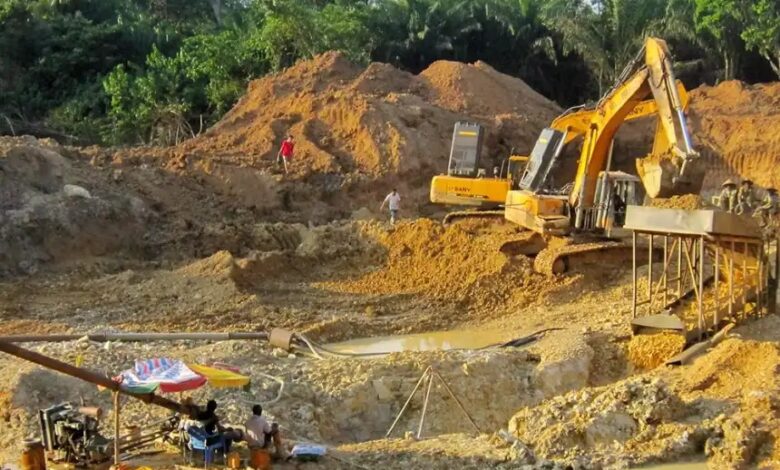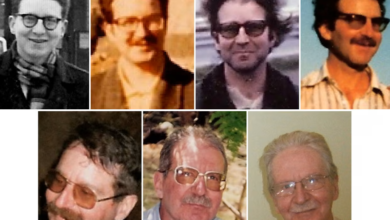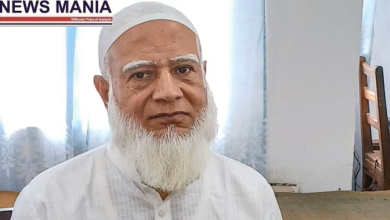As gold prices surge, Ghana faces ‘looming crisis’ over illegal mining
News Mania Desk \ Piyal Chatterjee \ 22nd january 2025

Upon seeing reports in September that Ghana’s water agency would be unable to provide some regions with water because of severe pollution in major rivers caused by small-scale mining, activist Oliver Barker Vormawor realized he needed to take action.
Later that month, Vormawor and many other worried Ghanaians marched in the capital, Accra, to demonstrate against what they described as President Nana Akufo-Addo’s failure to prevent a “forthcoming environmental disaster.” They were resolved to place the issue on the ballot before the fiercely contested general elections in December. Instead of receiving a response to their demands, Vormawor and some of his associates were detained and incarcerated for weeks on allegations of unlawful assembly. Although Akufo-Addo’s New Patriotic Party (NPP) has been ousted, activists such as Vormawor express little confidence in the new president, John Mahama, and his capacity to control the increasing pollution of Ghana’s rivers and soil.
Previously known as the “Gold Coast,” the West African country is struggling due to widespread and relentless small-scale mining of the gleaming metal. A considerable portion of that artisanal work is referred to by locals as “galamsey,” which is short for “gather them and sell.” The term initially described illegal mining conducted mainly by untrained young individuals, but it now more broadly includes licensed small-scale operations that engage in unsustainable practices.
Galamsey has long been practiced, but the global rise in gold prices, reaching nearly $3,000 per gram in late 2024, triggered a significant increase in illegal mining throughout Ghana, resulting in further severe damage to water bodies.
Small-scale miners consume significant amounts of water as they excavate soil near riverbanks in wooded regions and wash it away to uncover gold ore. They employ harmful substances like mercury and cyanide to extract gold from the ore, and those substances contaminate rivers that numerous communities rely on for drinking and household purposes. Certain individuals claim they make roughly $70 to $100 each day.
As of 2017, over 60 percent of the nation’s water bodies were contaminated with mercury and other heavy metals, transforming previously clear rivers into a murky brown, as reported by the country’s Water Resources Commission. The substances that may harm lungs are impacting thousands of acres of farmland. Ghana’s Cocoa Board (COCOBOD) reported a 2 percent decrease in the overall cocoa cultivation area due to mining activities. Certain farmers claim that galamsey operators either purchase their land or coerce them into selling.
“This is a problem that has been going on for decades now, but it’s a problem that’s escalating fast and this has created a sense among Ghanaians that we are running out of time to protect our country and our people,” Ewurabena Yanyi-Akofur, country director of the nongovernmental organisation WaterAid. “While illegal gold mining was happening mainly in the south of the country, our research shows that it’s now endemic in the north. The presence of mercury and other toxins in water is leading to skin diseases and other health crises,” she added.
Activists express strong frustration over LI 2462, a law from the Akufo-Addo administration that was enacted in November 2022, permitting mining concessions to be granted in the nation’s biodiversity hotspots, which encompass protected forests. An earlier policy restricted mining in protected reserves and forests to roughly 2 percent of their overall area.
Numerous activists during that period condemned the legislation and highlighted that the nation sacrificed the equivalent of 30,000 football fields due to deforestation caused by logging, agriculture, and the unlawful extraction of gold and other minerals such as bauxite that year.
Nevertheless, the government moved forward with the legislation and continued to grant mining licenses – for exploration, industrial activities, and small-scale mining, at an extraordinary pace. According to data from the Ghana Mining Repository, officials issued approximately 90 licenses from 1988 until early 2017, while over 2,000 additional licenses were granted between September 2017 and January 2025. That time is within Akufo-Addo’s administration. The majority of licenses were granted for small mines, with significant reserves such as the Nkrabia Forest Reserve, situated west of Accra, and the Boin Tano Reserve in the Western Region being included. Public outrage towards the Akufo-Addo administration grew after it became known that several of the companies recently licensed under LI 2462 were linked to influential politicians and members of Akufo-Addo’s NPP party, some of whom were also operating illegal mining operations.
In April 2023, a shocking report by ex-Environment Minister Kwabena Frimpong-Boateng to Akufo-Addo was made public. Frimpong-Boateng claimed that “numerous party officials … their acquaintances, assistants, agents, and family members” were involved in illegal mining activities. He charged, among others, Gabby Asare Otchere-Darko, a significant businessman and relative of Akufo-Addo, with meddling in the detention of mining firms that ravaged forests.
“It was widely known that they were utilizing this as a means to fundraise for the party, with officials securing their own small portions,” Vormawor, the activist, stated to Al Jazeera. Activists like him claim that the rise of small-scale mining led to an increase in illegal mines, due to the government’s inability to establish standards and provide oversight.
The Akufo-Addo administration rejected the accusations made in the Frimpong-Boateng report, stating it was a list of “personal grievances” lacking evidence. In October 2024, the government sent the military to various water bodies nationwide to combat illegal mining through a distinct “Operation Halt.” Nonetheless, the outcomes of galamsey are evident. On January 2, the Ghana water agency closed another water treatment facility, this time located in the western Tarkwa-Nsuaem area, due to extreme contamination of the River Bonsa, which supplies drinking water to over 200,000 residents in the region. For the second time in five months, officials were compelled to reduce supply.
“People need to distinguish between small-scale mining and illegal mining: small-scale mining is legal,” the president said. “There are ways of doing it without destroying the environment in Canada, Australia, and the United States. Technology exists. So why don’t we … train our people to do mining in a way that is safe for the environment? We’re willing to consider those things.”






